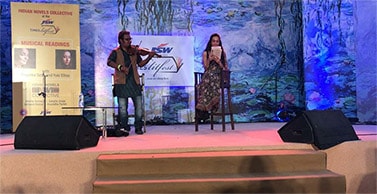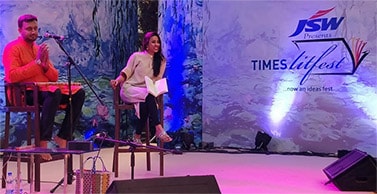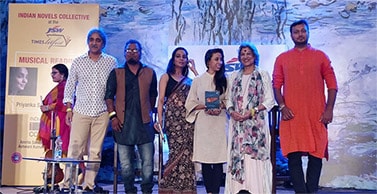July 19, 2021
Anamika Mohanta
Tags
Book launch
‘A translation of this beautifully written literary work helps us bring connections across cultures and helps us see the work in a new light.’
‘Main yahan chhatri ke neeche khadi hun aur wahan mera akelapan bheeg raha hai.’
Sahitya Akademi winner, poet and critic – Anamika – recalls her first reading of Pachpan Khambe Lal Deewarein during the official launch of the translation by Daisy Rockewell. While sitting at her ancestral home and the rains pouring down continuously, she could see Sushma Sharma in the rain, standing under an umbrella while her loneliness gets drenched in the downpour. It’s so strange how we relate a book to the emotion it evoked and the atmosphere we read it in – even if we eventually forget the plot. That’s the imprint brilliant books like Pachpan Khambe Lal Deewarein leave on their readers even when years have passed and the book becomes a mere recollection of emotion.
Daisy Rockwell, Anamika and Shinjini Kumar in conversation on the translation of Usha Priyamvada’s Pachpan Khambe Lal Deewarein
Pachpan Khambe Lal Deewarein, one of Usha Priyamvada’s best known works has now been translated into English by Daisy Rockwell. The novel narrates the story of Sushma Sharma – the novel’s protagonist – who is a lecturer at an all-women’s college in Delhi and the sole bread earner of her family in Kanpur. Dragging on to life with responsibilities and duties, Sushma’s life is turned topsy turvy with the arrival of a charismatic and young individual – Neel. Torn between making a ‘selfish’ choice of choosing her love or fulfilling her duties, Priyamvada’s novel explores the unseen shackles that bind women and dilemmas they constantly find themselves in. Pachpan Khambe Lal Deewarein has always been a much loved novel which was also adapted as a TV Series for Doordarshan. A brilliant piece of modernist literature which till date had only appealed to the Hindi-speaking audience could now enrapture the world breaking apart the language barrier.
A stimulating discussion during the book launch between Daisy Rockwell, Anamika and Indian Novels Collective’s co-founder Shinjini Kumar opened the many facets of the rather simple novel of women’s desires. The translator’s note which is a window to the entire text perfectly captures the essence of the book. It views the book from different angles, analyses it from various perspectives and enables the reader to receive it as they desire. She feels that public spheres, including the literary spheres often tend to sideline women’s stories as being ‘too dated’ even if they hold their relevance even today.
Being an open-ended novel, Pachpan Khambe Lal Deewarein shatters the common notion of ‘happy ending’ and inculcates the reality of women’s lives into its plot. Using shringar as an aesthetic and also as a metaphor, it symbolises how Sushma’s attire was all colourful even when her life lacked hues. Anamika beautifully put together the reality of Indian literature saying that ‘aesthetics, ethics and poetics go hand in hand in India.’ The vivid imagery employed by Priyamvada has been deftly translated keeping the cultural context in the language it is being translated to.
Women centric stories aren’t only limited to India. It’s astounding to see how parallels can be drawn between different cultures wherein women face similar dilemmas. Rockwell drawing cultural parallels between Sylvia Plath’s Bell Jar and Virginia Woolf’s A Room of One’s Own is one of the prime highlights of the launch. It establishes the fact that women’s dilemmas sacrifices are universal and not constrained.
The opposite of Pachpan Khambe Lal Deewarein happens in Priyamvada’s second novel – Rukogi Nahi Radhika where the protagonist leaves her widower father for her future with Manish – the man in her life. A thread binds both the novels together, as they deal with liberation in different senses.
Elaborating on her translation of this Hindi classic, Daisy explains how translation is about ‘choices’. Choices so as to capture the exact essence of the text as it is in its original language. While people usually critique what was ‘lost’ in translation, we should rather focus on what is ‘gained’ – expressions, literary tropes and windows to different cultures which otherwise would’ve been impossible.
Pachpan Khambe Lal Deewarein which has been Indian Novels Collective’s favourite since a long time – with our dramatised reading of the book in 2018 and publishing its translation now in 2021, we hope to unfurl the novel’s beauty to as many audiences as possible. A book where the Khambe stands for shackles and strength both, it evokes individual emotions in the reader who can receive it as their own consciousness allows them to. Daisy Rockwell’s beautiful and crisp translation of Usha Priyamvada’s novel has thus opened new doors to the Hindi literary world.




